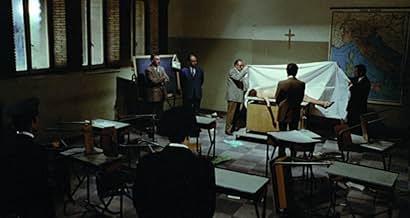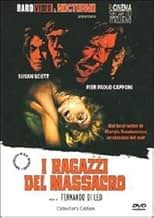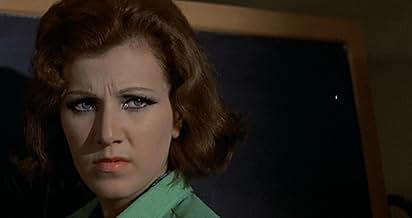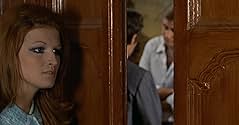Certains jeunes tuent leur professeur; mais ils ne diront pas leur motivation. L'inspecteur de police chargé de l'affaire ressent une influence sinistre derrière les jeunes meurtriers.Certains jeunes tuent leur professeur; mais ils ne diront pas leur motivation. L'inspecteur de police chargé de l'affaire ressent une influence sinistre derrière les jeunes meurtriers.Certains jeunes tuent leur professeur; mais ils ne diront pas leur motivation. L'inspecteur de police chargé de l'affaire ressent une influence sinistre derrière les jeunes meurtriers.
- Réalisation
- Scénario
- Casting principal
Nieves Navarro
- Livia Ussaro
- (as Susan Scott)
Danika La Loggia
- Beatrice Romani
- (as Danika)
Ada Pometti
- Florist - Sorella di Verino
- (as Priscilla Benson)
Avis à la une
Another masterpiece I'll remember, the flashbacks in the movie were done really, well. I don't thinlk the story was that good, but DiLeo once again made it into a masterpiece. After any of his movies I seriously can't watch anything else, he's to good. I'm seriously thinking of leaving my Job and becoming a director, and try to continue his legacy. This film, agan is based on the milano of the late 60s, when no one in Italy made real movies about outsider kids, but he dug deep and, as always made a masterpiece
The teacher of an evening school for youngsters with social problems is brutally raped and murdered right in her classroom. The only suspects are on the kids of course and the police is surprised to find them all quietly in their homes instead of having escaped. There is a reason. Each kid declares that he did not participate in the brutality but was forced to watch. The police officer Lamberti has reasons to believe that someone, an adult, has orchestrated the kids which are afraid to even mention this person. It will not be an easy case.
Fernando Di Leo takes us for this incredible trip among juvenile delinquency. Although the movie was made in 1969, Di Leo talks about drugs, veneral diseases, prostitution, transvestism, teenagers having sex with old women, homosexuality and incest much in advance compared to what still had to come in our society.
Fernando Di Leo delivers us a very interesting movie technically superb. The interrogation of the youngsters is done in a very sharp style. The rape scene, although very impressive, is simply done with a camera movement. The suspense is well built. Pier Paolo Capponi offers us an excellent interpretation. With him we have Livia Ussaro more interested in the social aspects of the youngsters: "The police doesn't care about the kids, who they are, what they wanted to be, what they do and why they do it, if they have feelings. They are considered criminals and that's all..." But for inspector Lamberti these words will not remain unheard. To solve the case he will also have to consider these aspects.
Fernando Di Leo. One of Italy's most interesting directors.
Fernando Di Leo takes us for this incredible trip among juvenile delinquency. Although the movie was made in 1969, Di Leo talks about drugs, veneral diseases, prostitution, transvestism, teenagers having sex with old women, homosexuality and incest much in advance compared to what still had to come in our society.
Fernando Di Leo delivers us a very interesting movie technically superb. The interrogation of the youngsters is done in a very sharp style. The rape scene, although very impressive, is simply done with a camera movement. The suspense is well built. Pier Paolo Capponi offers us an excellent interpretation. With him we have Livia Ussaro more interested in the social aspects of the youngsters: "The police doesn't care about the kids, who they are, what they wanted to be, what they do and why they do it, if they have feelings. They are considered criminals and that's all..." But for inspector Lamberti these words will not remain unheard. To solve the case he will also have to consider these aspects.
Fernando Di Leo. One of Italy's most interesting directors.
In the shadowed corridors of Milan's evening school, a chilling crime unfolds. "I ragazzi del massacro" (1969), directed by Fernando Di Leo, thrusts us into a world where innocence is a façade and brutality lurks beneath the surface.
In this Italian giallo-drama, a group of eleven streetwise adolescents, aged thirteen to twenty, inexplicably murders their teacher, Matilde Crescenzaghi. The police investigation yields no clear evidence, leaving the case shrouded in mystery. Pressed by an impatient judge, Police Chief Luigi Càrrua entrusts the case to Commissioner Luca Lamberti, his friend and collaborator. Lamberti, grappling with the murder's brutality, suspects a personal vendetta. With the help of agent Mascaranti and social worker Livia Hussar, Lamberti delves into the dark secrets of these troubled youths.
Di Leo masterfully portrays the complexities of each character. Their backgrounds, motivations, and vulnerabilities come to life, revealing the harsh realities they face.
Social Commentary: The film serves as a mirror to societal issues-poverty, neglect, and the erosion of innocence. These young criminals are products of their environment, victims of a system that failed them.
Franco Villa's cinematography captures Milan's gritty streets, emphasizing the stark contrast between the city's beauty and its hidden violence.
Lamberti's unorthodox interrogation techniques-harsh and relentless-add tension and urgency to the narrative.
"I ragazzi del massacro" doesn't shy away from darkness, but it lacks the finesse of Di Leo's later works. The rawness of its portrayal, however, leaves an indelible mark.
This film, like its characters, is a paradox-a blend of horror and empathy. Brace yourself for a journey into the heart of darkness. 🎬
In this Italian giallo-drama, a group of eleven streetwise adolescents, aged thirteen to twenty, inexplicably murders their teacher, Matilde Crescenzaghi. The police investigation yields no clear evidence, leaving the case shrouded in mystery. Pressed by an impatient judge, Police Chief Luigi Càrrua entrusts the case to Commissioner Luca Lamberti, his friend and collaborator. Lamberti, grappling with the murder's brutality, suspects a personal vendetta. With the help of agent Mascaranti and social worker Livia Hussar, Lamberti delves into the dark secrets of these troubled youths.
Di Leo masterfully portrays the complexities of each character. Their backgrounds, motivations, and vulnerabilities come to life, revealing the harsh realities they face.
Social Commentary: The film serves as a mirror to societal issues-poverty, neglect, and the erosion of innocence. These young criminals are products of their environment, victims of a system that failed them.
Franco Villa's cinematography captures Milan's gritty streets, emphasizing the stark contrast between the city's beauty and its hidden violence.
Lamberti's unorthodox interrogation techniques-harsh and relentless-add tension and urgency to the narrative.
"I ragazzi del massacro" doesn't shy away from darkness, but it lacks the finesse of Di Leo's later works. The rawness of its portrayal, however, leaves an indelible mark.
This film, like its characters, is a paradox-a blend of horror and empathy. Brace yourself for a journey into the heart of darkness. 🎬
Fernando Di Leo was undoubtedly the emperor of Italian crime-cinema during the late 60's and the 70's. The work he did on other genres wasn't exactly impressive (anyone remember "Asylum Erotica"?), but in the area of rough 'n tough exploitation thrillers he was absolutely unequaled. Di Leo has some of the sub genre's classics on his director's repertoire (like "Milano Calibro 9", "Manhunt" and "The Boss") and he even contributed a lot to writing other filmmakers' finest accomplishments, for example Ruggero Deodato's "Live Like a Cop, Die like a Man" and Romolo Guerrieri's "Young, Violent and Dangerous". This "Naked Violence" somewhat predates Di Leo's greatest work, but it certainly is an extremely convoluted and ambitiously scripted gem of Italy's most glorious cinematic cult years. Granted, the title is slightly deceptive and misleading (don't expect to see much nudity, nor violence), but nonetheless the complex screenplay hints at multiple controversial themes, like juvenile delinquency, teenage alcoholism, confused sexuality and rape. The movie opens bizarrely and impressively disturbing, with fuzzy flash-images of an entire classroom of drunken adolescent boys gang-raping their teacher before choking her to death with a handkerchief in the mouth. After the opening credits are finished, we learn that they're all boys with questionable backgrounds and mild criminal records, and the class they were attending actually was some kind of social project to still give them one last chance to normally integrate into society. The slightly unorthodox police inspector Marco Lamberti is charged with the investigation, but the case is very frustrating because the boys turn it into a game of blaming each other and act all innocent. Bit by bit, Lamberti discovers that the influence, as well as the heavy liquor that caused the kids to turn into rapist killers, comes from an adult who always remains in the shadows. This malicious person occasionally uses the young scoundrels for petty crimes, but now he - or she must have had a reason to revert to murder. The plot of Di Leo's "Naked Violence" is perhaps silly and far-fetched, but the tight dialogs and particularly the powerful acting performances make it rather plausible. Pier Paolo Capponi is splendidly cast as the stubborn cop and also the young cast members are truly convincing in their roles of menacing small-time thugs. The film is overall a bit too talkative and the script reveals too few clues to really get involved in Lamberti's investigation, but the story's evolution is always compelling and worth your complete attention. The flashbacks near the end are atmospheric and a little creepy, and the end-twist is ahead of its time albeit quite silly. Definitely worth purchasing if you're into the more challenging titles of the Italian exploitation-industry.
"I Ragazzi del Massacro" tells the story of the brutal rape and murder of a female teacher by the students in a classroom. The opening scene shows the teacher, the classroom and the students. There's no other sound beside the ominous soundtrack. She's is writing something on the blackboard and then we see the faces of the students. They don't seem about to start singing "To Sir with Love". We see their faces in close-up, the apprehensive look of the teacher. The scene builds to a crescendo till her rape and murder - this is not shown graphically but rather in an elliptical way. We see faces, pieces of flesh, her being undressed, the students crowding her.. Cut! In the next shot her dead body is lying naked and defenseless - it is surrounded by policemen. An investigation is about to begin.
The police detective Marco Lamberti (Pier Paolo Capponi) has to interrogate the students of the classroom to know the who, how and why. The students of this school are from the lower classes, come from reformatories, live lives in which poverty and violence are their daily companions. But police detective Lamberti is indignant - all he wishes is to crack some heads. Curiously, after the rape & murder scene, I myself was so full of anger that I felt in sympathy with the cop's indignation. It's funny! On seeing a film, I'm not the one who roots for the cops. Especially if there's a lot of finger wagging and preachiness. But "I Ragazzi del Massacro" doesn't follow the easy way - the crime is shown in all its hideousness, but we are given also brief glimpses into the lives of those students - illness, violence, hopelessness...
Lamberti has to find out who started the thing, and he can't lay a finger on the students - they are under age, and Italy, after all, is a democracy.
Lamberti is teamed up with a social worker, Livia (Nieves Navarro/Susan Scott). Justice and compassion work hand in hand to find out what happened. But make no mistake. This is not a political film in the strictest sense of the word - it's just a crime flick with a social consciousness.
What is remarkable is the honesty and crudity of "I Ragazzi del Massacro". This was very rare at the time. And even now, if the same story were told by Hollywood, it would be transformed into the usual tear-jerker - the tears would be followed by revenge and crowned by beautiful moral lessons.
The acting overall is very good - the tough but sensitive Lamberti (Pier Paolo Capponi), the students, the lovely Susan Scott as the social worker etc.. The soundtrack is a gem, it is scary and ominous without being too flashy. The story is well told and there are many surprises in store - it's not a predictable film at all! The film hooked me from the beginning to the end.
What are you waiting for? See this film if you can.
The police detective Marco Lamberti (Pier Paolo Capponi) has to interrogate the students of the classroom to know the who, how and why. The students of this school are from the lower classes, come from reformatories, live lives in which poverty and violence are their daily companions. But police detective Lamberti is indignant - all he wishes is to crack some heads. Curiously, after the rape & murder scene, I myself was so full of anger that I felt in sympathy with the cop's indignation. It's funny! On seeing a film, I'm not the one who roots for the cops. Especially if there's a lot of finger wagging and preachiness. But "I Ragazzi del Massacro" doesn't follow the easy way - the crime is shown in all its hideousness, but we are given also brief glimpses into the lives of those students - illness, violence, hopelessness...
Lamberti has to find out who started the thing, and he can't lay a finger on the students - they are under age, and Italy, after all, is a democracy.
Lamberti is teamed up with a social worker, Livia (Nieves Navarro/Susan Scott). Justice and compassion work hand in hand to find out what happened. But make no mistake. This is not a political film in the strictest sense of the word - it's just a crime flick with a social consciousness.
What is remarkable is the honesty and crudity of "I Ragazzi del Massacro". This was very rare at the time. And even now, if the same story were told by Hollywood, it would be transformed into the usual tear-jerker - the tears would be followed by revenge and crowned by beautiful moral lessons.
The acting overall is very good - the tough but sensitive Lamberti (Pier Paolo Capponi), the students, the lovely Susan Scott as the social worker etc.. The soundtrack is a gem, it is scary and ominous without being too flashy. The story is well told and there are many surprises in store - it's not a predictable film at all! The film hooked me from the beginning to the end.
What are you waiting for? See this film if you can.
Le saviez-vous
- AnecdotesDuca chain smokes fashionable Astor cigarettes.
- GaffesThe soft, feminine hands of the instigator of the crimes develop hair on them during the rape.
- Citations
Duca Lamberti: Fiorello Grassi's a pederast.
- ConnexionsFeatured in Italian Gangsters (2015)
Meilleurs choix
Connectez-vous pour évaluer et suivre la liste de favoris afin de recevoir des recommandations personnalisées
- How long is Naked Violence?Alimenté par Alexa
Détails
- Durée1 heure 32 minutes
- Couleur
- Rapport de forme
- 1.85 : 1
Contribuer à cette page
Suggérer une modification ou ajouter du contenu manquant

Lacune principale
By what name was La jeunesse du massacre (1969) officially released in India in English?
Répondre




















